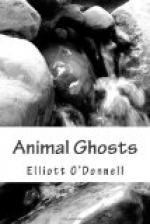“Saepe sinistra cava praedixit ab ilice cornix.”
A number of crows are stated to have fluttered about Cicero’s head on the day he was murdered.
Pliny says, “These birds, crows and rooks, all of them keep much prattling, and are full of chat, which most men take for an unlucky sign and presage of ill-fortune.”
Ramesay, in his work Elminthologia (1688), writes:
“If a crow fly over the house and croak thrice, how do they fear they, or someone else in the family, shall die.”
The bittern is also a bird of ill omen. Alluding to this bird, Bishop Hall once said:
“If a bittern flies over this man’s head by night, he will make his will”; whilst Sir Humphry Davy wrote:
“I know a man of very high dignity who was exceedingly moved by omens, and who never went out shooting without a bittern’s claw fastened to his button-hole by a riband, which he thought ensured him ‘good luck.’”
Ravens and swallows both, at times, prognosticate death. In Lloyd’s Stratagems of Jerusalem (1602) he says:
“By swallows lighting upon Pirrhus’ tents, and lighting upon the mast of Mar. Antonius’ ship, sailing after Cleopatra to Egypt, the soothsayers did prognosticate that Pirrhus should be slaine at Argos in Greece, and Mar. Antonius in Egypt.”
He alludes to swallows following Cyrus from Persia to Scythia, from which the “wise men” foretold his death. Ravens followed Alexander the Great from India to Babylon, which was regarded by all who saw them as a fatal sign.
“’Tis not for nought that the raven sings now on my left and, croaking, has once scraped the earth with his feet,” wrote Plautus.
Other references to the same bird are as follows:
“The raven himself
is hoarse
That croaks the fatal
entrance of Duncan
Under my battlements.”—(Macbeth.)
“It comes o’er
my memory
As doth the raven o’er
the infected house,
Boding to all.”—(Othello.)
“That tolls The sick man’s passport in her hollow beak, And in the shadow of the silent night Doth shake contagion from her sable wings.” (Jew of Malta.)
“Is it not ominous in all countries
where crows
and ravens croak upon trees?”—(Hudibras.)
“The boding raven
on her cottage sat,
And with hoarse croakings
warned us of our fate.”
(The Dirge.)
“In Cornwall,” writes Mr. Hunt, in his work on popular beliefs, etc., of the West of England, “it is believed that the croaking of a raven over the house bodes evil to some of the family. The following incident, given to me by a really intelligent man, illustrates the feeling:
“’One day our family were much annoyed by the continual croaking of a raven over the house. Some of us believed it to be a token; others derided the idea. But one good lady, our next-door neighbour, said:




